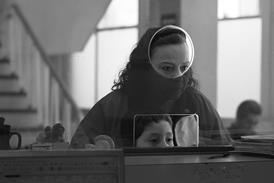The heads of International Film Festival Rotterdam (IFFR) have revealed how its juries will watch films in cinemas despite the pandemic and shared fresh details of its physical festival in June.
Speaking during the latest ScreenDaily Talks, IFFR festival director Vanja Kaludjercic outlined plans for how the five jurors in its flagship Tiger Competition would screen the 16 selected titles during the festival, which runs online-only from February 1-7.
“I’m a bit jealous because the juries are the only ones who will see films on the big screen,” said Kaludjercic. “We have organised private screenings, with every precaution in place, across three cities.”
Filmmaker and visual artist Lemohang Jeremiah Mosese (who will also participate in one of the festival’s Big Talks) will watch the competition titles in Berlin’s Wolf Kino cinema, in a socially-distanced way alongside artistic director of International Documentary Film Festival Amsterdam (IDFA) Orwa Nyrabia. The other jury members, including visual artist and filmmaker Hala Elkoussy, critic Helena van der Meulen and film producer Ilse Hughan, will view the films at the Eye Film Museum in Amsterdam.
“The screenings will take place in a room that allow jury members to sit far away from each other… and they will follow all the protocols, with testing a possibility,” explained Kaludjercic.
The jury will compare notes daily over Zoom before deciding the winner of the €40,000 Tiger award and two special jury awards, worth €10,000 each.
Further private showings will take place at Rotterdam’s Kino cinema for members of its Big Screen Competition and Ammodo Tiger Shorts jury. Ensuring the films are screened with the full effect of the big-screen experience “is something we’re very committed to,” said Kaludjercic, who added that they would not seat more than five people in a cinema at any one time.
Replicating the festival experience online
It will mark the first edition as director for Kaludjercic, and a landmark 50th for the festival itself.
Taking place after the events of the past year, with lockdown restrictions still in place across Europe, has meant just 43 films have been selected, as opposed to around 270 that usually make up the programme.
A decision to move fully online also saw “some films decide to opt out and wait for the possibility of this or another festival showing it on a big screen,” according to Kaludjercic.
But the number of submissions were as high as ever and IFFR is working to replicate the festival experience, creating exposure for filmmakers and a connection with audiences, through live introductions and Q&As as well as virtual screenings.
The industry side of the festival, under the banner IFFR Pro, is already underway and industry head Marit van den Elshout said concerns about a lack of international participation were short-lived.
“Initially, we were afraid things would become very local and international programmes would be put on hold, but the opposite is true,” she said. “We have 74 producers from 40 countries so people are really look for access to information… and people are optimistic again.
“We’ve put a lot of time into discussing with all the filmmakers and rights holders what the specific need are for each film in terms of publicity, guidance, sales and distribution,” she added of the industry platform, which includes the CineMart co-production market.
“We wanted to organise something that could offer a feeling of community and a sense of connection for filmmakers to their potential audience, other industry members and fellow filmmakers.”
Van den Elshout highlighted themes of “identity, belonging and a lot of things we’re dealing with as humankind, such as ‘where is home’,” in the projects she is seeing.
“The silver lining of this year is how we’ve had to adapt our activities,” she said. “There’s more close connection and focus.”
Summer event
Looking beyond next week’s festival, Kaludjercic revealed fresh details of IFFR’s summer event, which is set to run from June 2-6, with greater emphasis on the 50th anniversary (June is the month when IFFR’s first edition took place).
“As soon as we’re done with the February session, we will start announcing titles for June,” said Kaludjercic, stating that a “big part of the selection” had already been completed.
The programme will include IFFR’s non-competitive sections, including its Bright Future and Harbour strands. But it will also invite 50 luminaries associated with IFFR’s past including former Tiger Competition winners, festival directors and projectionists who worked at the event for decades.
Kaludjercic also hinted at “one great commissioned project that we’ll present in the outdoor space” and was hopeful to “welcome larger audiences, if government regulations allow”.
“I’m not going to say large, but larger,” she stated, adding with a note of caution that “it would be premature to completely exclude an online component”.
Prior to the summer event, IFFR will present 50 films from each year of the festival on its Unleashed on-demand platform, bridging the gap between the February and June events.
Asked if she planned to repeat hosting two events per year by Screen International editor Matt Mueller, who hosted the session, Kaludjercic replied with a laugh: “Let’s see how this year goes!”
























No comments yet